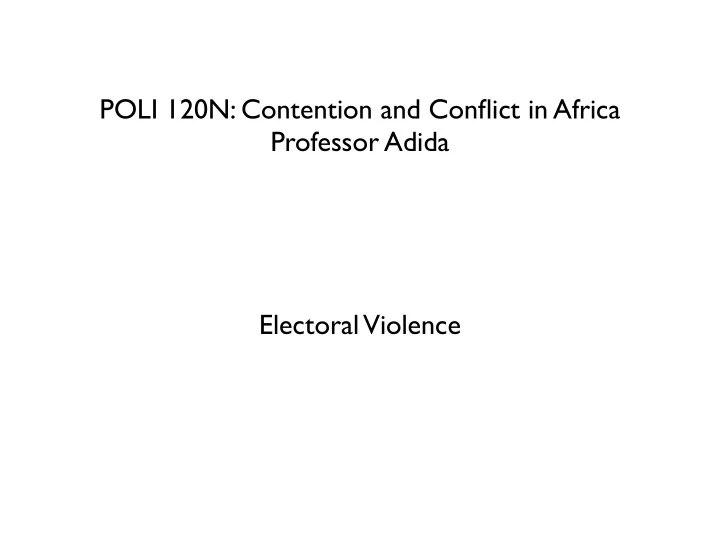

POLI 120N: Contention and Conflict in Africa Professor Adida Electoral Violence
Democratization in Africa 0 -2 avgpolity -4 -6 1960 1970 1980 1990 2000 year
Polity Score • Country experts code countries on • Executive recruitment • Constraints on executive authority • Political competition 0 -2 avgpolity Sub-Saharan Africa -4 -6 1960 1970 1980 1990 2000 year
www.systemicpeace.org/polity/polity4.htm
Democratization in Africa 0 -2 avgpolity -4 -6 1960 1970 1980 1990 2000 year
Democratization Factors • External influence ✓ Changes in WB model of development ✓ End of Cold War ✓ New technologies for mass communication ✓ French model (bicentennial) ✓ US aggressively promoting democracy by 1990 • Internal influence ✓ Backlash against WB SAPs ✓ Legitimacy crisis ✓ Mandela’s release
Q: True or False, according to the Polity project, Africa today is more autocratic than any other region of the world a. True b. False
Democratization = Stability? 1.3 1.2 1.1 avggdp Growth 1 .9 8 GDP per capita (thousands) .8 6 1960 1970 1980 1990 2000 year Democracy 4 2 0 1960 1970 1980 1990 2000 Year africagdp asiagdp lagdp menagdp
Democratization = Stability? Council on Foreign Relations
Arriola and Johnson 2012
1985-2005 Arriola and Johnson 2012
The electoral fallacy “... the crude simplicity of multiparty elections, which allows some of the world’s most notorious autocrats to parade democratic credentials without reforming their repressive regimes.” Claude Ake (1991)
theguardian.com globalpost.com aviewfromthecave.com
theguardian.com salon.com allafrica.com
Electoral violence (Straus and Taylor) • Definition: physical violence and coercive intimidation directly tied to an impending electoral contest or to an announced electoral result • Universe of cases: elections in SSA 1990-2007 • Dimension variations • Who: incumbents vs. challengers • When: pre-vote vs. post-vote • Level of violence: high vs. low
Broad patterns (S&T) Dimensions Statistics Incumbents perpetrate 85% of violent cases 19% of pre-election violent cases Challengers perpetrate 40% of post-election violent cases Pre-vote violence 94% of violent cases, 76% of high-violent cases Post-vote violence 30% of violent cases; 37% of high-violent cases High electoral violence 19% of elections Harassment 39% of elections No violence 42% of elections
Determinants of electoral violence (S&T) ✓ Smaller margin of victory ✓ Less consolidated democracy ✓ More migration; more group competition over resources ✓ Middle-income ✓ Past pathways to power
Côte d’Ivoire, an example www.revue-medias.com
Côte d’Ivoire: prototype ✓ Small margin of victory ✓ Young democracy ✓ Competition over resources, migrants/locals ✓ Middle-income ✓ Past pathways to power: coups and coercion
Electoral Violence (A&J) • Politicians rely on patronage systems (corruption) to lower stakes of office and reduce uncertainty associated with elections. When they no longer have access to corruption, the stakes of office go up, leading to electoral violence • Contrasts with Structural argument Incumbent Opposition Business
Determinants of electoral violence (A&J) • Test argument in 596 national elections held worldwide 1985-2005
But Kenya? Isn’t Kenya highly corrupt? Didn’t it experience violence?
In sum • Useful to identify broad patterns (Straus and Taylor) • But when it comes to explaining electoral violence, need to think about (Arriola and Johnson) • Actors • Preferences • Strategies • Political elites want to stay in power and employ a menu of options to do so • Trade-off between corruption and electoral violence
Q: Political scientists like to explain things like conflict and violence as the outcomes of trade-offs leaders face. Which of the following is not a trade-off we have discussed in this class? a. Trade off between rebellions and coups b. Trade off between winning a primary election and winning a national election c. Trade off between corruption and electoral violence
POLI 120N: Contention and Conflict in Africa Professor Adida Electoral Violence
Recommend
More recommend